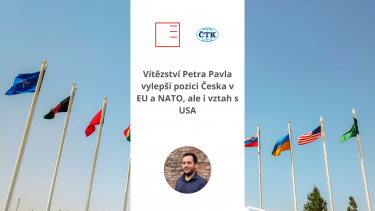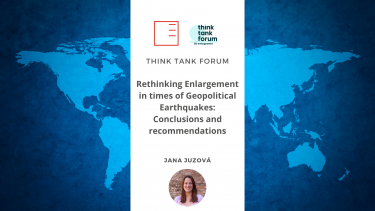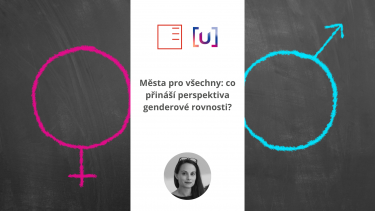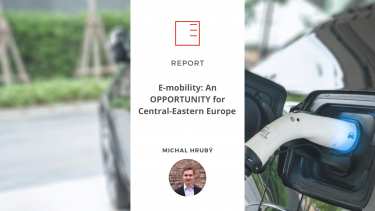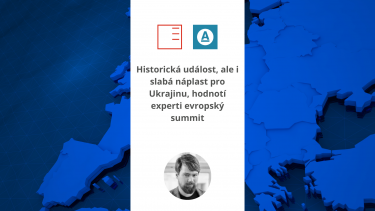SUMMARY OF EXPERIENCES WITH THE INVOLVEMENT OF CSOS IN V4 IN THE DECARBONISATION PROCESS
The project is focused on the examination of the role of non-governmental organizations in the process of decarbonization of coal regions in V4 countries (Czech Republic, Hungary, Poland, Slovakia). The aim of the project is to describe the best and worst practices of the individual processes for Serbia, who awaits the transformation of its energy mix, largely based on coal. The examined V4 countries have had a slightly different share of coal in their energy mix, while the largest one being in Poland and the second largest one in the Czech Republic, followed by Hungary and Slovakia. There are many similarities and differences in their takes on decarbonisation, thus providing different range of experiences.
Show more PDF

ČTK: Petr Pavel's victory will improve the Czech Republic's position in the EU and NATO, but also relationship with the USA
The head of our Brussels office, Žiga Faktor, commented for ČTK on Saturday's victory of Petr Pavel in the presidential elections on the relationship with the EU and NATO. He mentioned that Pavel's accession could bring about a unification of the foreign policy of the government and the Foreign Ministry. He also suggested that the newly elected president would have better relations with the United States
Show more
BLOG | “A Close Neighbor Is Better Than a Distant Relative” - Belt and Road Initiative: Are We Closer After 10 Years?
In 2013, the Chinese president introduced the New Silk Road project, also known as the Belt and Road Initiative. It was to connect China with countries in Central Asia, the Middle East, Europe and maritime regions with the purpose to coordinate policies and link infrastructure. However, the initiative, and especially China's role in it, raises many questions and doubts. What is its future? This is what our intern Šárka Váchalová discusses in her blog.
Show moreThink Tank Forum | Rethinking Enlargement in times of Geopolitical Earthquakes: Conclusions and recommendations
This policy brief summarizes the conclusions of the EU Enlargement Think-Tank Forum “Rethinking Enlargement in times of Geopolitical Earthquakes” organized in cooperation with Heinrich Böll Stiftung Prague Office and other partners.
Show moreURBACT: Cities for all: what does a gender perspective bring?
Our research associate Katarína Svitková wrote an article for URBACT. In the text, she outlines where gender is an issue in urban planning and management and how this perspective can help build better cities for life.
Show more
Decarbonization of the Industrial Sector: Sustainable Finance as an Opportunity?
EUROPEUM Institute for European Policy partnered up with the institutions from the Visegrad Group countries and now leads the project consortium. The main objective of the project is to identify priority policies that will enable the decarbonisation of heavy industry in a way that is consistent with the commitments of the Visegrad Four countries to limit future global warming to 1.5 °C. To reach this objective, partners conduct original research and engage the local stakeholders.
Show more PNGREPORT: E-mobility: An OPPORTUNITY for Central-Eastern Europe
Our researcher Michal Hrubý wrote a report from a conference titled E-mobility: An OPPORTUNITY for Central-Eastern Europe, where the challenges and opportunities of e-mobility transition in the region were discussed.
Show more PDFINVITATION: Debate: / Débat d'idées : "80 years ago, General de Gaulle declared the Munich Agreement null and void"
We would like to invite you to a debate on "80 years ago General de Gaulle declared the Munich Agreement null and void". On 29 September 1942, General de Gaulle declared the Munich Agreement null and void from the outset. It was a powerful gesture and an unappreciated act of resistance. How can we understand his declaration? Why on this day? What were the immediate consequences for relations between the Czechoslovaks and the French? And what, in general, is the legacy of the Munich Agreement in France, in the Czech Republic and at the heart of Franco-Czech relations?
Show more
Background Study | Minerals and Metals for the energy transition
On Thursday 8 September 2022, a briefing was held under the leadership of the European Climate Foundation and with the support of EUROPEUM Institute for European Policy, entitled: "Do we have enough minerals and metals to achieve energy transition and electromobility?". The briefing also produced a short background study on Minerals and Metals for Energy Transition.
Show more PDFAktuálně.cz: A historic event, but also a weak patch for Ukraine, experts comment on the European summit
Statesmen from all over Europe gathered in Prague for the first ever meeting of the European Political Community. The summit is being held as part of the Czech Presidency of the Council of the European Union and is one of the largest the Czech Republic has ever experienced. The extent to which the meeting is a bringing non-member states to joining the EU is also being debated. Martin Vokálek, our Executive Director, commented on the summit and the expectations associated with it for Aktuálně.cz, stressing its importance as a platform for discussion.
Show more
Staroměstské náměstí 4/1
Prague 1 - Staré Město
110 00
tel.: +420 212 246 552
email: europeum@europeum.org
https://www.europeum.org

